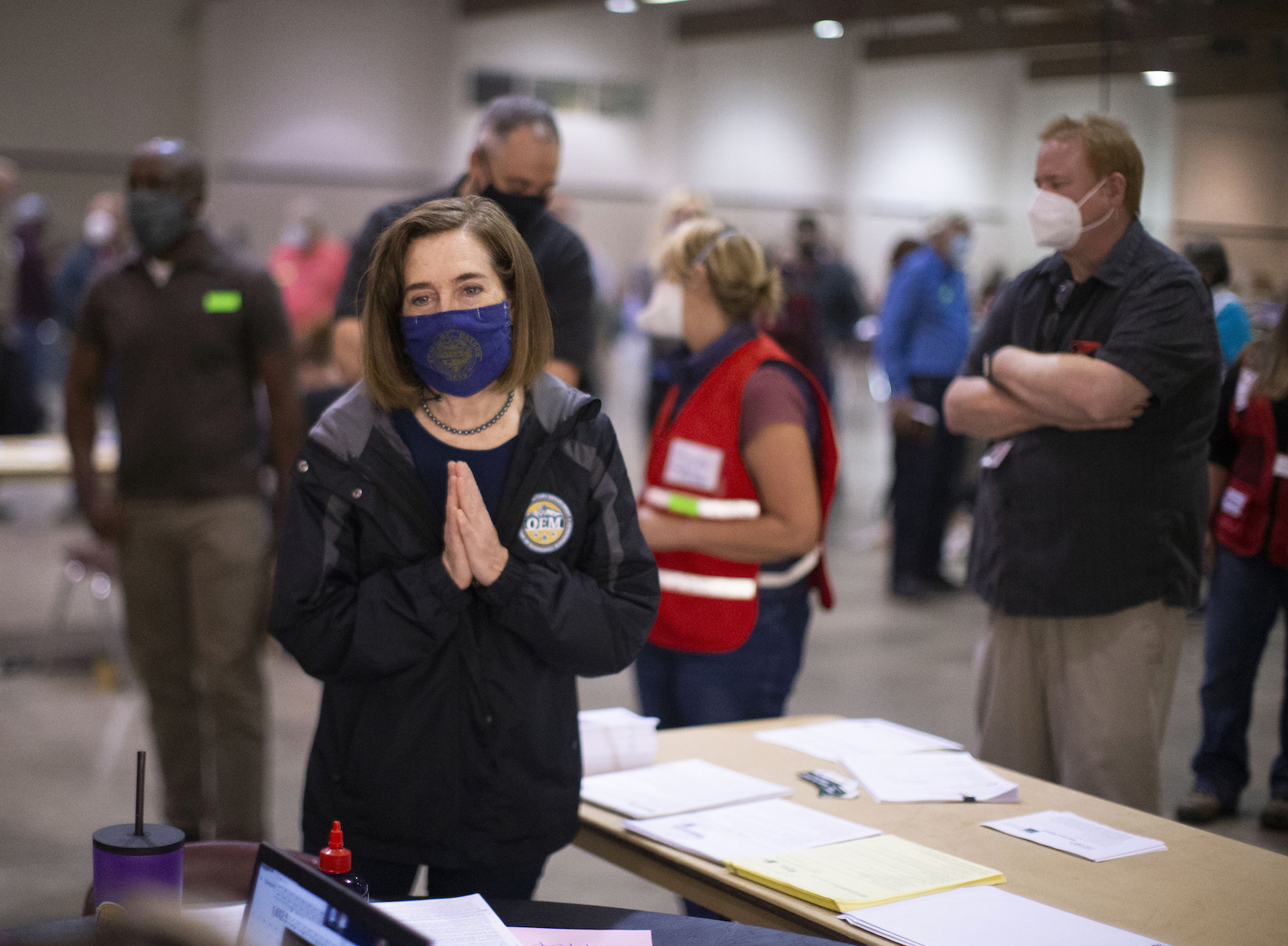While most of the trials and tribulations of 2020 were nothing anyone could have foreseen, there is one we all knew would come for years now, and yet is no less of a historical event: the election.
This election year, a global pandemic spread across the U.S. and pushed people into their homes, protests for police reform and racial justice pulled people into the streets and the country continues to be increasingly polarized by politics. Now, everyone gets to vote about it.
And vote people did. With a universal mail-in voting system, current events left Oregon’s election largely unchanged, and by the end of election night, a record number of 2.4 million Oregonians had cast their ballots. The turnout percentage was 81%—no record, but slightly edging out 2016’s 80%.
Here is what they voted for.
Portland
After a close primary and an even closer runoff, Ted Wheeler will serve a second term as Portland’s mayor after narrowly beating out opponent Sarah Iannarone. He will be the first Portland mayor to serve a second term since Vera Katz, who won her first reelection in 1996.
Wheeler won the race with 46.2% of the vote as of Nov. 6, while Iannarone pulled in with 40.8%. An additional 13% went to write in candidates, a pool that included community activist Teressa Raiford, who ran a write-in campaign.
Being the incumbent was a running point for Wheeler, who campaigned on leading and continuing to lead Portland through the COVID-19 pandemic and protests for police reform. Wheeler narrowly missed winning reelection in the May primary, but without 50% of the vote, missed the mark required for an outright win by about 1%.
“The people of Portland are powerful,” Wheeler said in his statement following the election. “We are united by a deep conviction in shared values. Black Lives Matter. The urgent need to restore a safe climate. Safe and affordable housing as a right. Economic opportunity for all. Preschool and a great education for every child. I’m proud of our response to the pandemic. And I’m proud of the progress we’ve made on housing, homelessness, economic opportunity and climate change. But there is more to do.”
Both candidates are Democrats, but Iannarone campaigned as a more progressive alternative to Wheeler, a political moderate. Both candidates named similar priorities, including economic recovery after COVID-19, houselessness, public safety, police reform and climate change. However, Iannarone promised a stronger approach. Her campaign also emphasized running on public campaign financing and small donations from community members.
“I love that over half of Portland voters went not for the status quo, but for change, this election,” Iannarone said, after conceding the race and congratulating Wheeler during a livestream on Wednesday. “We must remain conscious of all the victories while conceding this one battle…it is our collective responsibility to empower Mayor Wheeler to succeed, and also to hold him accountable.”
Portland City Council also had one last race for commissioner this year, where Community Organizer Mingus Mapps beat incumbent Chole Eudaly with 55.7% of the vote.
Mapps’ win cements the most diverse city council Portland has ever had. Carmen Rubio, who won her commissioner seat during the May primary, will be the first Latinx member of the council, and Mapps will be the fourth Black member. Along with Jo Ann Hardesty, three of the five city council seats—which includes the mayor—will be people of color.
The race between Mapps and Eudaly was another fight between moderate and progressive politics, where moderate politics won again.
Along with politicians, the election brought with it new measures for voters to consider, the most notable of which is one to create a new police oversight committee for the city. The measure passed overwhelmingly with 81.7% of the vote, more than any other city measure.
With its passage, the city of Portland will begin to create a new system for police accountability, run by a civilian committee. The new committee will replace the Independent Police Review, which is run by the city auditor, and will have the power to investigate uses of deadly force by police and allegations of police misconduct.
Oregon
The state itself has measures of its own. Four made it onto the 2020 ballot, and all four of them passed.
Two are unique to Oregon: Measures 109 and 110.
Measure 109, which passed with 55.7% of the vote, makes Oregon the first state to legalize the supervised use of psilocybin mushrooms, a hallucinogenic drug, for use in mental health treatments. Psilocybin is classified by the federal government as a schedule one drug, which is labeled as having a high risk for abuse and no approved use in medicine, and is currently illegal in Oregon. However, measure 109 will give the Oregon Health Authority two years to develop a program for psilocybin therapy, where the use of psilocybin will be supervised by therapists, and only in state-licensed facilities.
Measure 110, with 58.5% of the vote, makes Oregon the first state to decriminalize illegal drugs, which includes drugs such as cocaine, meth and heroin. The measure reclassifies the possession of these drugs as a civil, rather than a criminal, offense. The measure also pulls funding from Oregon’s marijuana taxes to go toward addiction recovery services and treatment.
Oregonians also passed Measure 107, amending the constitution to allow laws that can limit campaign donations, and requiring that campaigns disclose the donations and who paid for them, with 78.4% of the vote. Measure 108 passed with 66.4%, raising Oregon’s cigarette tax and establishing a tax on e-cigarettes.
Oregon’s governor had no election this year, but other executive offices did—and have all gone to the Democratic party.
The only one that wasn’t filled by a Democrat before was the secretary of state position, currently held by Republican Bev Clarno, who was appointed after the death of previous Secretary of State Dennis Richardson. As part of that appointment, Governor Kate Brown added the condition that Clarno could not run for reelection, which she agreed to.
The office now goes to Oregon Senator Shemia Fagan, with 50.4% of the vote.
Among the responsibilities of the position is to be first in line for governor, if the office is ever left vacant. The secretary of state is also charged with overseeing Oregon’s elections, and after the census, if the state legislature can’t approve a way of drawing new boundaries for state congressional districts, the responsibility will fall on the Secretary of State—a key responsibility, ahead of redistricting in 2021.
Both incumbent State Treasurer Tobias Ree, and incumbent Attorney General Ellen Rosenblaum won reelection, with 51% and 56% of the vote, respectively.
United States
Oregon, a strong blue state that hasn’t voted Republican in the presidential race since 1984, had its 2020 pick called for former vice president Joe Biden almost as soon as polls closed. Since Friday, Biden continued with a comfortable lead at 56.5% and is slated to take Oregon’s 7 electoral votes.
As for Congress, Senator Jeff Merkley won his reelection bid with 57% of the vote against Republican opponent Jo Rae Perkins. Representatives Suzanne Bonamici, Earl Blumenauer, Peter DeFazio and Kurt Schrader all won reelection in their respective congressional districts.
Congressional District Two stands out as the reliably red side of Oregon, tasked with voting for a new representative after incumbent Greg Walden announced he would not seek reelection. Fellow Republican Cliff Bentz won with 60% of the vote.
Below the shield:
All election data comes from the Oregon Secretary of State’s office. All totals are considered unofficial until certified.






